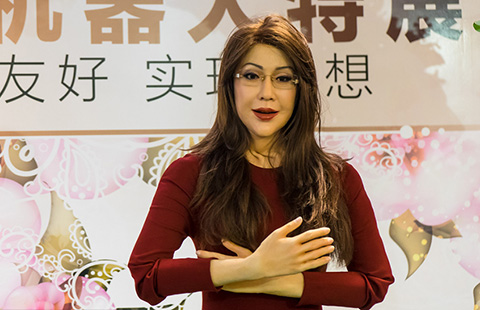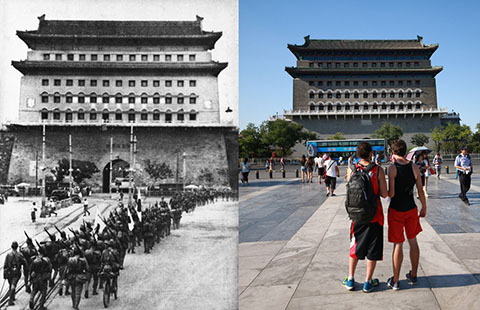Religious worshippers are getting younger
Updated: 2015-07-09 07:17
By XU WEI(China Daily)
|
||||||||
 |
|
Muslims worship at a mosque in Urumqi, capital of the Xinjiang Uygur autonomous region, on Monday.[WANG ZHUANGFEI/CHINA DAILY] |
China's religious followers are becoming younger, with more than half of worshippers under 60 years old, according to a report released on Tuesday.
The China Religious Survey, conducted by researchers at Renmin University of China, found that the age range of the country's religious followers has undergone profound changes over the past decades as now a majority of believers are under 60 years old, with Islam having the largest number of followers under 30.
The researchers polled 4,383 religious venues in 243 counties or districts across the country between the second half of 2013 and the first half of 2015.
"However, people with a low degree of education remain a dominant group among all the followers, with only 5 percent of the followers having college degrees or above," said Wei Dedong, vice-dean of the school of philosophy at the university and a leading researcher.
More than 43 percent of religious followers received primary school education or less.
The survey focused on the five most influential religions in China: Buddhism, Taoism, Protestantism, Catholicism and Islam.
Meanwhile, a majority of the clergy are now aged between 30 and 60.
Of the leaders of religious venues, 21 percent are women and 15 percent have bachelor's degrees or higher.
The research showed that the clergy generally have incomes far lower than the local average, which is quite different from the public perception that religious venues can generate lots of revenue through donations.
The average monthly allowance for clergy in religious venues was only 506 yuan ($81), according to the report. The situation is even worse for Buddhist monks, who have an average allowance of 397 yuan per month.
The clergy's income mainly comes from donations, admissions, and allowances from the local governments, the policies of which vary from place to place.
The report also shows that 41 percent of religious venues have not purchased pension insurance for their clergy, and 26 percent of the venues have not purchased medical insurance.
Buddhism remained the religion with the strongest influence in China, and it recorded the largest average yearly donation of 41,000 yuan for each temple, according to the report.
It is also the religion that places the strongest emphasis on using the Internet to reach out to followers, with 14 percent of Buddhist temples having resorted to the Internet.
In one particular case, Venerable Master Xuecheng, president of the Buddhist Association of China, has maintained the habit of interacting with followers on his Sina Weibo account for more than five years.
"Quite surprisingly, more than 11 percent of Taoist temples have conducted international exchanges, the highest ratio among the five religions," he said.
"It indicated that Taoist philosophies are being increasingly studied in the world, and foreigners are increasingly willing to come to China to learn more about the religion," he said.

 Plane makes emergency landing after fire
Plane makes emergency landing after fire
 Ten photos you don' wanna miss - July 8
Ten photos you don' wanna miss - July 8
 Female robot sings in Shanghai
Female robot sings in Shanghai
 Stunning images of Tibetan Buddhist pilgrims
Stunning images of Tibetan Buddhist pilgrims
 Then and Now: Beijing’s historic sites as witnesses of war
Then and Now: Beijing’s historic sites as witnesses of war
 In photos: China from above
In photos: China from above
 Serena Williams beats sister Venus to reach last eight
Serena Williams beats sister Venus to reach last eight
 Culture insider: Six things you may not know about Minor Heat
Culture insider: Six things you may not know about Minor Heat
Most Viewed
Editor's Picks

|

|

|

|

|

|
Today's Top News
SCO summit to take up India's membership
Xi, Putin agree to actions on connectivity proposals
China shares listed in US see selling
US orchestra to play China
China answers Clinton charges
President Obama addresses IS threat
China has ability to deal with risks to economy: premier
Govt prefers peaceful means in resolving maritime row: Envoy
US Weekly

|

|






